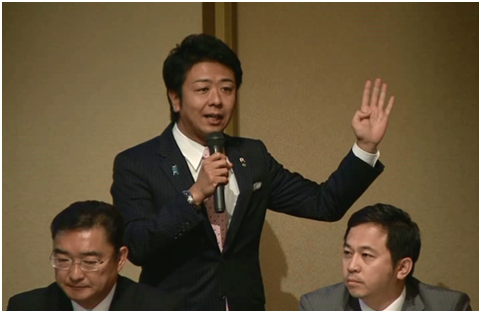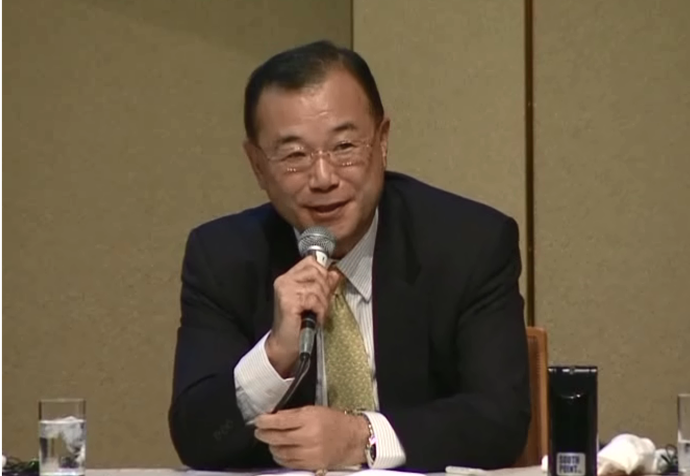【Panel Discussion】
Expectations for Global Talent
and the Role of Global Talent in Fukuoka
◆Coordinator Ota Hiroshi, Professor, Center for Global Education, Hitotsubashi University
◆Master of Ceremonies Yashio Keiko, Freelance Broadcaster / Special Visiting Professor at Gakushuin University
◆Panelists - Ota Kazuhide ,Professor and AQ Program Leader at Kyushu University
- Ryuzoji Kensuke, President & CEO, Honda Kiko CO., Ltd.
- Fujimi Tetsuo, Executive Concierge, Startup Cafe
- Sakurai Takafumi, Manager, Graduate Agent Service Department, Graduate Recruitment,
Recruit Career Co., Ltd.
- Takashima Soichiro, Mayor of Fukuoka City
◇Master of Ceremonies: Yashio Keiko
The theme of today's panel discussion is "Expectations for flobal talent and the role of global talent in Fukuoka." We will discuss this with the five panelists. First of all, I will ask them to introduce thier efforts of this topic.
Ⅰ The Current Situation in Fukuoka and Some of Our Efforts
1. Introduction
My name is Takashima Soichiro, I serve as the Mayor of Fukuoka City. I would like to introduce the current situation in Fukuoka and some our efforts.
2. What Outcomes Is Fukuoka City Aiming at?
Fukuoka City aims at becoming one of the “leading cities in Asia” where the people, environment and city’s energy are well-balanced and active. I’m not saying that I would like to make the city full of high-rise buildings. I wouldn’t like to make the city a place which is only rich in nature. I would like to make the city a place which has rich culture, traditional festivals, citizens who help each other in need, rich nature, and locally produced, safe foods that everyone can eat free from anxiety. I would like to make the city a place where many international students come to study from overseas, connecting countries in the world by air or by sea, and where global companies gather and conduct their business. Fukuoka City aims to become a role model city where people, the environment and the city’s energy are well-balanced.

3. Progress as Global City Fukuoka
The Asia-Pacific Children’s Convention in Fukuoka started 26 years ago (in 1989). Fukuoka City decided to move in the direction of emphasizing “Asia” around that time. Currently, it is second to Kyoto among the designated cities in Japan in the ratio of international students to the total population and third among them in terms of the number of diplomatic offices in the city. Fukuoka City is one of the largest international cities in Japan.
Many tourists visit Fukuoka from overseas every year. The number of incoming tourists to Fukuoka City reached 17,560,000 in 2013, hitting a record high. In terms of the number of port calls of cruise ships operated by foreign shipping companies, Hakata Port was first in Japan last year (in 2014), recording 99 calls. It is certainly expected to record more than 240 port calls this year (in 2015) and more than 400 next year (in 2016). Fukuoka City is now a holy site for Japanese cruise ships.
In terms of the number of international conferences and meetings held, Fukuoka City is second in Japan following Tokyo. Since it became second in Japan in 2009, the number has been increasing every year, and 336 international conference and meetings per year are held here in Fukuoka City.
4. Startup Cafe
Fukuoka City is now supporting the estabilishment of startups. At "Startup Cafe" established in October 2014, you can talk to and seek advice from lawyers or administrative specialists to improve your business plans or consult with them on other things relating to starting business in many different lanaguage free of charge at one place. This is one of hte advantages in estabilishing a startup in Fukuoka.
5. National Strategic Special Zone and Startup Visa
Fukuoka City is designated as a “national strategic special zone.” In an area meeting of national strategic special zones last week, the startup visa program proposed by Fukuoka City was recognized for the first time in Japan. For non-Japanese entrepreneurs wishing to start a new business in Japan, to qualify for a visa for this purpose, they need to open an office as well as hire two or more full-time employees or have an amount of capital or a total amount of investment equal to or more than five million yen. These requirements are very high bars, but since Fukuoka City has been approved to implement the “startup visa” program as a “national strategic special zone,” foreign entrepreneurs who do not meet the above requirements may be able to receive a six-month visa in Fukuoka in the future by submitting a new business plan to the city and being approved with the prospect of meeting the requirements.
Moreover, international students need to return to their country if they cannot find a job in Japan within one year after graduation. However, it may be difficult for them to find a company that they really want to work for in such a short term of only one year. Fukuoka City is considering discussing the extension of the term from the current one year to a two-year term in the national strategic special zone in the future.
6. Waterfront District
While Fukuoka City holds many international conferences and meetings, there are actually more requests for holding international conferences and meetings. However, because we do not have enough places available for all of these needs, we had to decline 52 such offers last year. The economic losses for this might have reached 19 billion yen.
To solve these problems, Fukuoka City is currently pursuing a redevelopment plan for the waterfront district (Central pier and Hakata pier), inviting contributions from the public.
We are receiving many suggestions from around the world for the redevelopment plan, including plans for upgrading MICE facilities and strengthening the environment to accept cruise ships.
7. Fukuoka Airport
Many domestic and international flights are arriving and departing from Fukuoka Airport, and Finnair has decided to launch service in Spring 2016. While many domestic and international flights are expected to come into service in the future, the Fukuoka Airport's capacity is reaching its limit.
Accordingly, Fukuoka Airport started the construction of a new runway in 2015, July to increase its capacity and respond to the new demand.
8. Tenjin Big Bang
Fukuoka City is a very convenient city since the airport is located near the city. However, due to the location of the airport close to the city, the construction of high-rise buildings is regulated in the Tenjin area. Accordingly, by taking advantage of the national strategic special zone and by receiving special approval in terms of building height restrictions of the Civil Aeronautics Act, Fukuoka City will be able to build buildings two floors higher than before. Moreover, under Fukuoka City’s own measures and policies, we will ease the floor-area ratio restrictions and aim to reconstruct about 30 buildings in the Tenjin area in the next 10 years. The project called “Tenjin Big Bang,” which aims to significantly improve city functions and increase the floor area of such buildings, has currently started in Fukuoka City.
9. Conclusion
Fukuoka City is trying to slove various challenges to move forward to the next stages. I hope that we ca look at thing not only from a local perspective but also from a global perspective to make the city more livable nad pleasurable together Thank you for your attention.
Ⅱ. Kyushu University's Efforts to Work on the Training of Global Talent
1. Introduction
My name is Ohta Kazuhide. I’m from Kyushu University Graduate School of Engineering. I’d like to introduce Kyushu University’s efforts to work on the training of global talent.
2. Number of International Students
The number of international students at Kyushu University has been increasing since 2008 when the government launched the “Plan to accept 300,000 international students.” Over 2,000 international students are currently studying at Kyushu University. About 55% of them are from China and 12% of them are from Korea, followed by Indonesia and Vietnam.
The number of Japanese students at Kyushu University who have studied abroad, including those who studied abroad for a short period or who participated in language courses, is about 760, which accounts for about only one-third of the number of international students. I believe that we have to work on improving the number of Japanese students who study abroad in the future.

3. Top Global University Project
Kyushu University’s projects relating to international students include the “Top Global University Project.” As part of this project, the Faculty of Engineering and the Faculty of Agriculture have been providing an international course in their bachelor’s programs since 2010. Moreover, all Graduate Schools have been providing an international course, too.
In addition, we have introduced a program in which students can receive bachelor’s degrees from both from Kyushu University and the overseas university he/she attends and provide various short-term study abroad programs, including the Silicon Valley training program for students in science and engineering majors, in which they have the opportunity to visit IT companies supported by the Kyushu University Office in the State of California, and the summer English language training program at Queensland University in Australia.
We also provide support to international students who participate in internship programs. Moreover, since 2008, we have implemented the Kyushu University AQ Program for international students who wish to find a job in Japan.
4. Kyushu University AQ Program
Based on the “Asia Human Resources Fund” program, which was started in fiscal year 2007 by the Ministry of Economy, Trade and Industry (METI) and the Ministry of Education Culture, Sports, Science and Technology (MEXT), Kyushu University launched the AQ Program (Asia Human Resources Program) in 2008 to support international students in engineering who wish to find a job at a Japanese company. Even after the “Asia Human Resource Fund program terminated in 2012, Kyushu University has continued to implement the program as its own independent program. Over 100 international students have been sent from the AQ Program so far.
Targeted students of the AQ Program constitute about 15 percent of all international students at Kyushu University. However, we work on matching the students with Japanese companies and set a goal of having all the targeted students find a job in Japan. Our rate of targeted international students who receive an unofficial job offer is 100%.
In the Kyushu University AQ Program, we invite instructors directly from companies to deliver lectures on Japanese companies. As for Japanese language proficiency, which is one of the key points in finding a job in Japan, we have acquired a full-time Japanese language instructor from the Kyushu University International Students Center to provide support in learning Japanese. Moreover, we support internships actively in collaboration with companies.
When inviting instructors from companies, we always try to invite the head of a company. Hearing a story directly from such persons makes it easier for international students to imagine clearly what products they would make and what kind of business they would conduct if they were to find a job with the company.
One of the most popular lectures conducted in collaboration with industry is the lecture by Mr. Hayashi Ryosuke, Executive Officer of TOTO Washlet Techno Ltd. He talks about how the Washlet was developed for the first time in Japan about 30 years ago. His lecture is very impactful and popular among our students.
5. Conclusion
We would like to engage in this endeavor so that we can continue to implement the Kyushu University AQ Program. Thank you for your attention.
